The connection between a book and its reader is a miraculous and complex one, in its innate ability to heal. Each word is like medicine. Although stories are more often than not written by the victors, the silenced have fought for their voices to be heard, understood and respected. This ongoing battle beautifully intertwines empowerment, togetherness and clarity in a literary space. To acknowledge minorities’ truths is to empower them. To be conscious of these communities is to stop erasing them. But to continue to brush our stories under the rug is to diminish the importance of our lives. This article delves into the multifaceted stories of eight beautiful book enthusiasts and their personal journeys.

Iris Castro
Biography: Iris Castro is a young Latinx born and raised in Cuba. She majored in English Language and Literature in Holguin and Havana Universities. After moving to Miami, Castro has worked with several local tv and radio stations. She currently works for NBC / Telemundo as a Content Producer / Social Media Reporter. IG: @irisbooklist
1.) When did your love for books begin?
I’ve loved to read since I can remember. My mom used to tell me stories about how, as a little kid, I memorized my favorite children’s books. Reading has always been my ‘happy place”.
2.) Favorite types of books?
Historical fiction, memoirs, thrillers/mystery…. nonfiction in general is my jam, but I’m very open to try new genres. This year I read (and loved) many poetry books!
3.) Why is it so important to see representation for womxn of color, minorities and other marginalized people in the creative space of writing? And more importantly, published for others to read their truths?
Where to start! No one will tell our stories better than ourselves. Our books have to represent our world. A beautiful, diverse, mixed, complex world where womxn, Latinxs, African Americans, Asians, Native Americans, members of the LGBTQIA+ community…and many other minorities and marginalized groups, live and thrive. We have a powerful voice and we need to use it to tell our truths. That’s how we make our stories count. Representation really matters.
4.) What brings you Alegría?
Hugging my mom, eating my grandma’s arroz con frijoles, singing out loud, helping others, reading… Seeing womxn empowered and empowering others. That makes me happy!
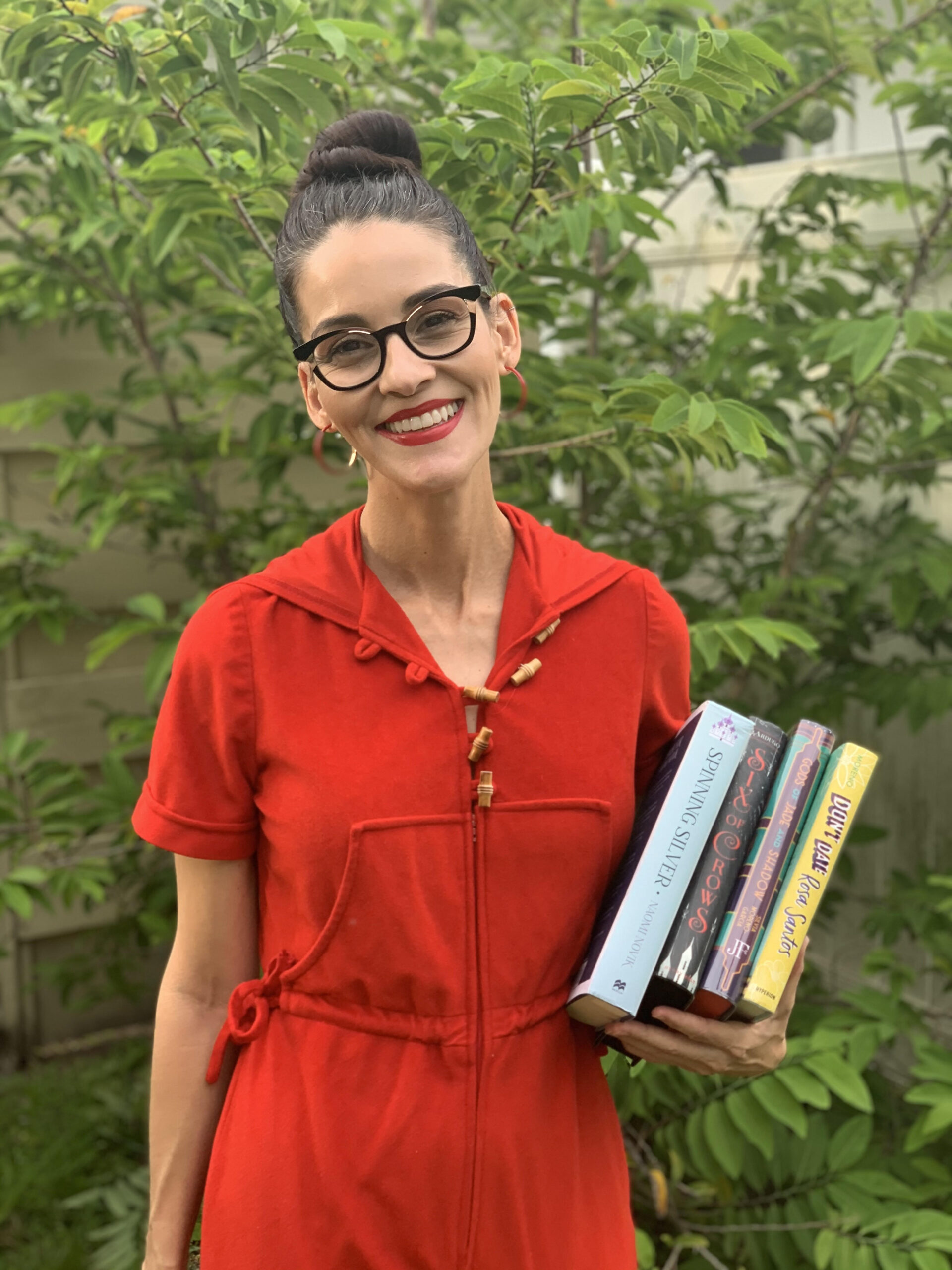
Carmen Alvarez
Biography: Carmen of Tomes and Textiles is a Cuban-American book lover living in Florida. She enjoys taking photos and reviewing books on bookstagram, focusing mainly on Latinx and YA books with a bit of vintage fashion and feminism thrown into the mix. IG: @tomesandrextiles
1. When did your love for books begin?
I began my love affair with books the first time I walked into my elementary school library. I remember walking in and thinking to myself that I wanted to read all the books on the shelves. Since then, there has barely been a time where I have not been reading at least one book at a time, if not multiple.
2. Favorite types of books?
I mostly read young adult fiction contemporary and science fiction and fantasy books. After college, I experienced a reading slump and this was the genre that pulled me back into reading regularly. While I do read adult fiction and non-fiction, there is a certain amount of identity and hope steeped into YA that I can’t seem to find any place else that keeps me coming back to this genre over and over again.
3. Why is it so important to see representation for womxn of color, minorities and other marginalized people in the creative space of writing? And more importantly, published for others to read their truths?
I strongly believe that representation matters for many reasons, starting with the fact that the majority of books published are by white authors, featuring white main characters. That is a fact backed up by years of data. It is indisputable. The data also states that there hasn’t been a dramatic shift since representation in over a decade. Regardless of what some believe, there is a massive discrepancy in who is represented in literature, as well as in publishing. It isn’t good enough to have ONE book by ONE marginalized writer because the myriad of marginalized experiences are vast and diverse. We need to see the variety of experiences that exist around the world and while it isn’t going to change tomorrow, every book published with marginalized representation is a step towards a better future of children seeing themselves within the pages of books.
4. What brings you Alegría?
Happiness is a warm cup of coffee on a lazy Saturday morning after a long yoga session, reading a book with my partner at my side and my dogs at my feet and a record playing in the background. I find more and more that my happiness stems from the comfort of sitting still in a world screaming out to keep hustling.
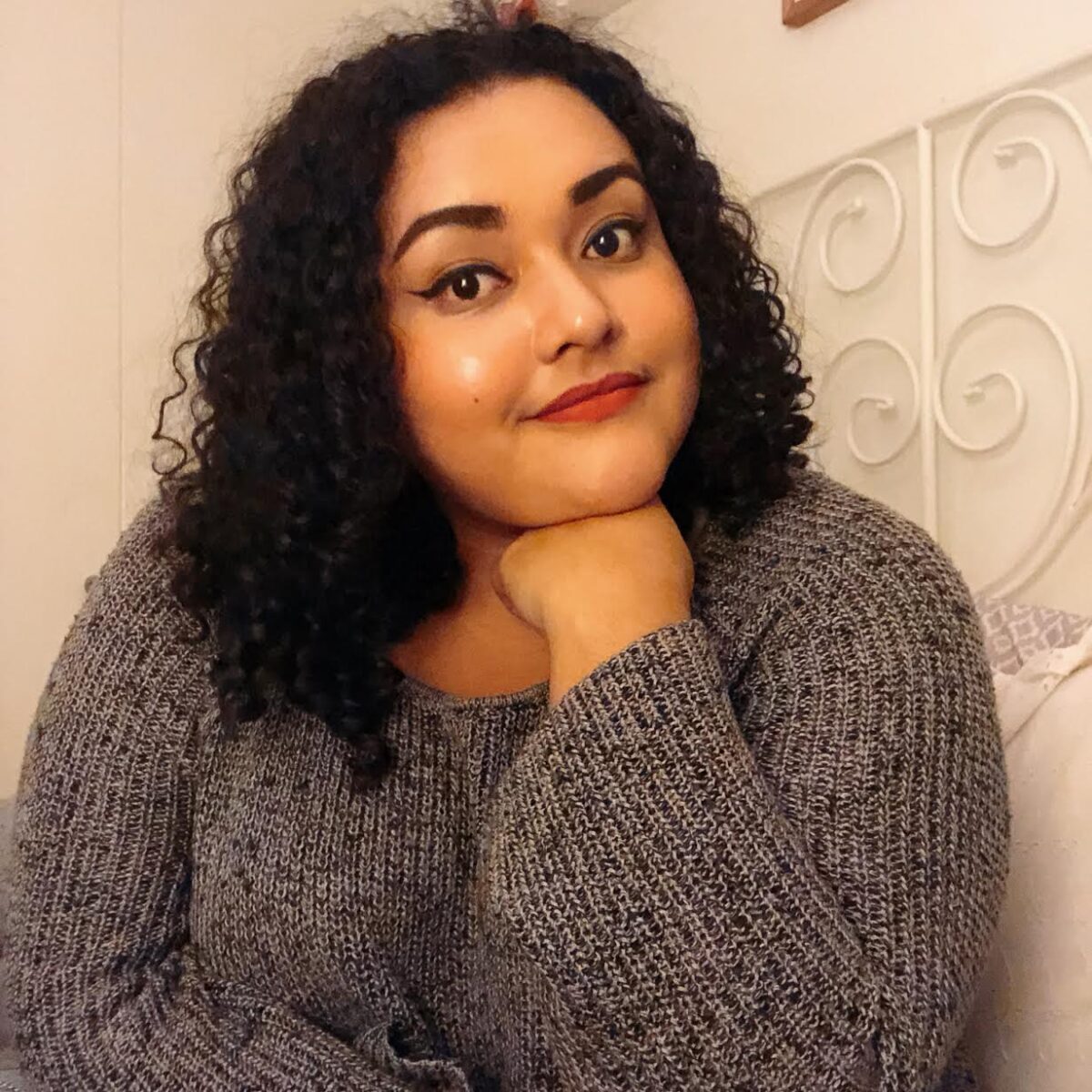
Ana Bermudez
Biography: Ana Bermudez is a twenty-six year old native to San Diego, California. She graduated in 2016 from the University of California (UCSB) with a degree in English. After that, Bermudez lived in South Korea for a year teaching English to elementary and middle school students. She’s just graduated with a master’s degree in school counseling and hopes to become a school counselor at either a middle and high school. IG: @readingwithana
1. When did your love for books begin?
I don’t remember the exact moment I fell in love with reading. I do remember fondly my parents taking me to the library every other week to check out books. I would devour books all the time. My love for reading was what eventually pushed me to major in English in college.
2. Favorite types of books?
I feel I like an array of genres. I am always willing to go out of my comfort zone and read books I wouldn’t normally pick up. Some of my favorite go-to genres are fantasy, romance, and literary fiction. When it comes to nonfiction, I have been gravitating a lot towards any that deal with social justice.
3. Why is it so important to see representation for womxn of color, minorities and other marginalized people in the creative space of writing? And more importantly, published for others to read their truths?
I feel this is so important. Although there have been improvements, there is work still to be done. Being able to read about the experiences of people like yourself and others expands your worldview. It allows you to understand more of what other people have experiences, especially ones whose identities you do not share. I believe it helps build empathy. Also seeing yourself in other’s writing makes you feel less alone.
4. What brings you Alegría?
These days, spending time with my parents and cat and being able to still keep in touch with friends, albeit only through texting and Facetime. And of course, reading.
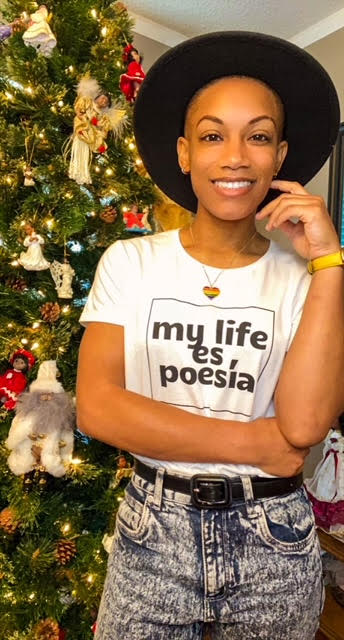
Sol Kelly
Biography: Sol Kelly is the content creator behind The Sol Reader blog and Bookstagram. The New Orleans native currently resides in Houston, Texas. The free-spirit loves traveling, learning about her own and new cultures and languages, and exploring bookstores. Sol’s a mood reader whose favorite genres are literary and contemporary fiction, social science, gender, sexuality, memoirs, and poetry. She dedicates The Sol Reader (Instagram: @thesolreader) to the lovers of books, language, adventure, and self-expression.
1. When did your love for books begin?
I fell in love with books at a very early age, probably from the moment I learned how to read. My love for books progressed excessively in elementary and middle school, especially once I found series and novels that I thoroughly enjoyed.
2. Favorite types of books?
I tend to gravitate to literary and contemporary fiction, memoirs, poetry, and nonfiction reads centered around social science and gender/sexuality. All of my favorite books usually fall under those categories.
3. Why is it so important to see representation for womxn of color, minorities and other marginalized people in the creative space of writing? And more importantly, published for others to read their truths?
Representation for womxn of color, minorities, and other marginalized people in the creative space of writing and in published works is imperative to these groups having their identities and experiences highlighted by those who understand and acknowledge what it means, looks like, and sounds like to be a part of such groups. Having writers and creators from these groups who can contribute to written and published works provides us with first hand accounts and nurtures the belief that individuals of those communities can play the leading role in their lives, to feel like those words are our own. It is empowering and symbolic of what can be achieved.
4. What brings you Alegría?
Happiness is a constant journey for me. I am most happy when I am spending time with family and friends, reading an intriguing book, watching a good movie, traveling to new places, and am in spaces in which I can be my authentic self.

Jackie González
Biography: A proud daughter & baby sister of immigrants, Jackie González is a first-generation Xicana living in Southern California. She prides herself as a story-advocate & currently manages the virtual book community Traviesa Reading Club. Jackie is a recovering political staffer & former lobbyist having previously worked in the U.S. House of Representatives & representing public higher ed institutions. IG: @traviesa_readingclub
1. When did your love for books begin?
Storytelling was always big in my family. My love of story & books truly begins with mi mamá. A mother of 5 children, working full-time, an immigrant, growing up she always found the time to tell us her stories- sometimes real, sometimes ones that were passed on, and sometimes ones that she imagined. I’ll never forget the long car rides where I sat next to her and listened to her cuentos. Mis hermanos were also my storytellers, passing on the scary stories and legends from México our tías once told them: La Llorona, the haunted inheritance house, killer muñecas, etc. (Horror legends are definitely a right of passage in our cultura).
But, it was mi mamá who always encouraged my love of reading as a kid. Finding me books from the thrift shop she worked at & admitting to me the comfort that she felt when she saw me pick up a book. I sometimes think it brought her comfort because it meant that I could imagine a new & better story for myself. Now, as an adult, I look at books not to imagine a new & better story, but to recognize that my own story is also beautiful and valid.
2. Favorite types of books?
As a lover of personal story, my instinctual draw is to memoirs. And, as a super empathetic Pisces sun, I’m also a sucker for poetry. However, this last year, speculative fiction like sci-fi, fantasy and graphic novels have been my escape and let me just say, BIPOC authors have been killing it in the genre fiction-world! (Shoutout to Silvia Moreno-Garcia, Rebecca Roanhorse, Kayden Phoenix, etc.)
3. Why is it so important to see representation for womxn of color, minorities and other marginalized people in the creative space of writing? And more importantly, published for others to read their truths?
For so long we have been advocating & shouting to industry that not only do the stories of our communities deserve to be told in the mainstream, but that we ARE the mainstream. Without BIPOC folks’ contributions, there would be NO industry- publishing, film, TV, music, dance, etc. How often our stories have been appropriated for a white gaze and been massively successful (i.e. the disastrous publication of American Dirt in 2020), yet no credit and/or equitable compensation is offered to BIPOC creators. All I have to say is “¡Ya basta!”
4. What brings you Alegría?
With 2020 making it extremely difficult to do all the external things that make me happy—
exchanging physical presence and energy with my family and friends, attending ceremony with my elders, traveling to my México lindo y querido, and the cathartic feeling of singing at the top of my lungs with other strangers at a music concert. So, if anything, this year has really taught me to intentionally embrace all the little things make me happy—cuddles with my dog Benito, the smell of cedar and burning copal, getting to enjoy breakfast every morning with my partner, the opening line in a book, literally anything that gives me that gut-wrenching belly laugh, and really any chance I get to go outside in nature or exchange, even if just a few, words with a loved one. Oh, and making the decision to create a digital book platform via Traviesa Reading Club and connect with folks from all over the US, México, and Puerto Rico has made me pretty happy this year, también!
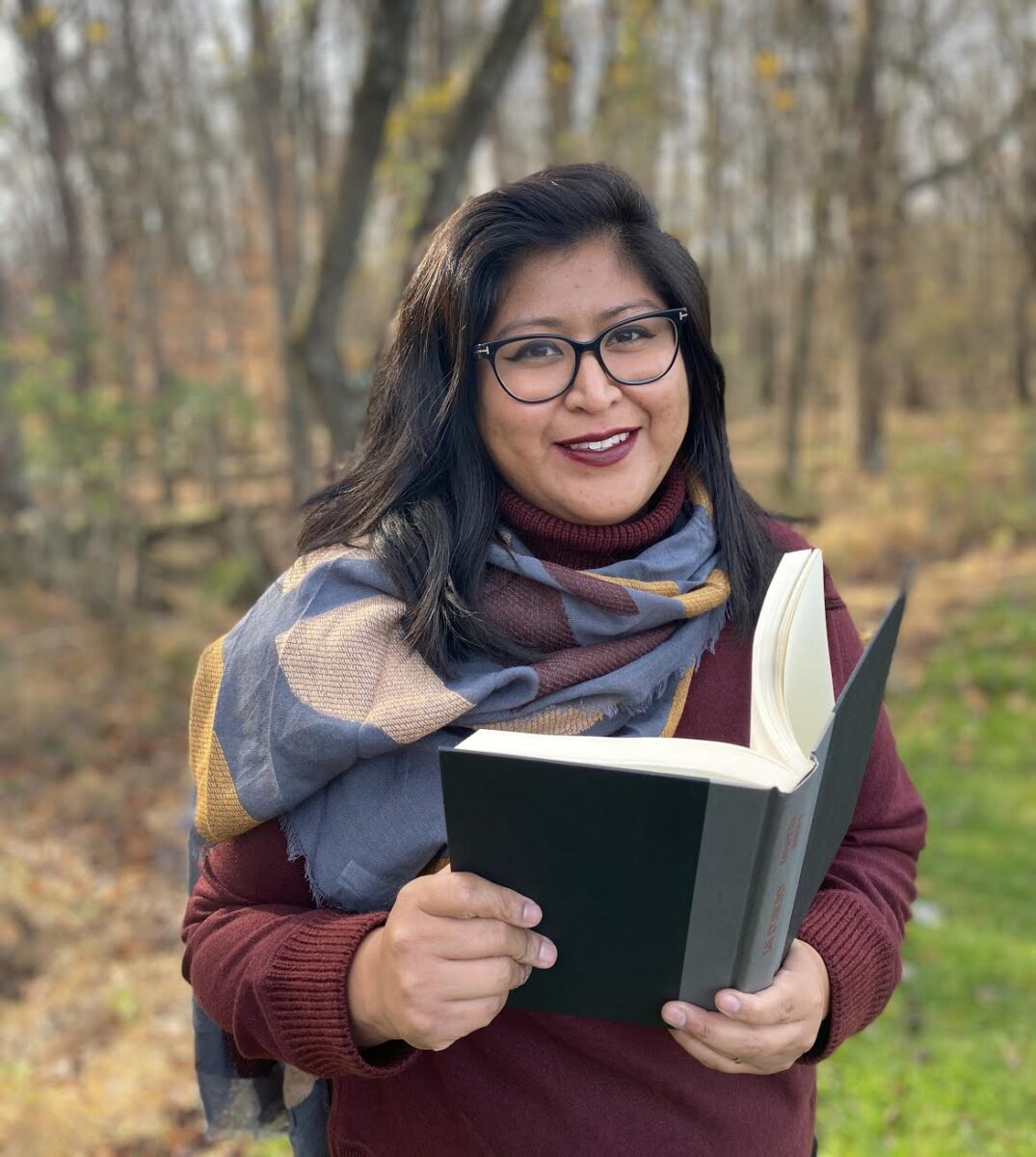
Lupita Aquino
Biography: Lupita Aquino –better known as Lupita Reads– is a columnist for the Washington Independent Review of Books, a contributor for the Reading Women podcast and curates monthly book recommendations for BESE. IG: @lupita.reads
1. When did your love for books begin?
My initial love for books began when I picked up my first National Geographic magazine. I remember realizing how much I could learn about places far away & begin to imagine different types of places that existed.
2. Favorite types of books?
I love books that explore the complexity of family dynamics as well as books that build layers into characters begging the reader to try & answer an impossible question- is this person good or this person bad? I think those types of books really help me understand that nothing exists as a single thing, every thing or person can have mutual truths.
3. Why is it so important to see representation for womxn of color, minorities and other marginalized people in the creative space of writing? And more importantly, published for others to read their truths?
Representation of marginalized writers in publishing is important because it allows marginalized readers to see their stories reflected on the pages. I am personally the type of reader that engages with books as a form of healing and learning about my lived experiences. There have been so many times a book has given me the language to explain something I went through that I didn’t know how to talk about before. I think every reader deserves the right to experience that & by publishing more and more marginalized writers that will be even more possible.
4.What brings you Alegría?
My family. The support & safe space my wife provides me & the joy & happiness our son brings me is really what keeps me going whenever I feel like the world is too much. I would be lying if I didn’t also say books/reading
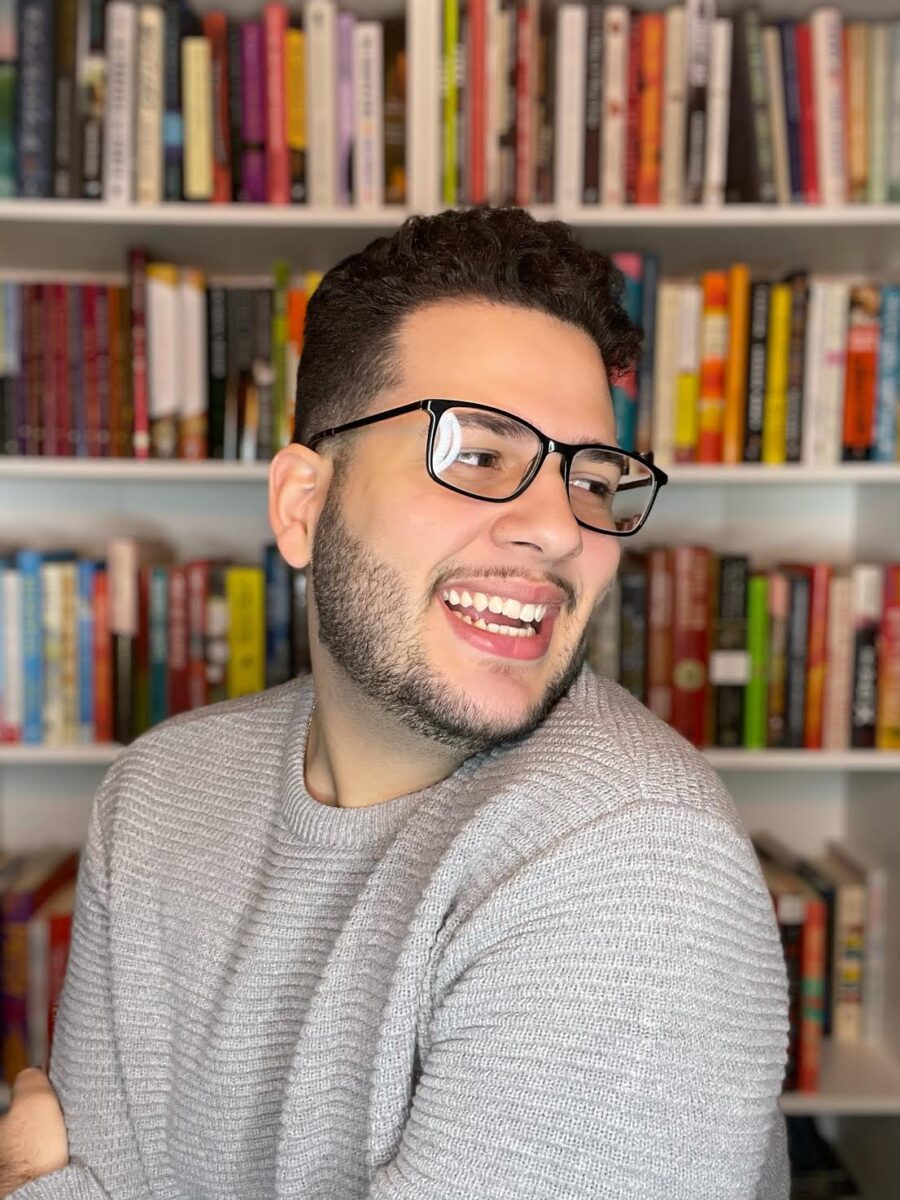
Oscar Almonte-Espinal
Biography: Oscar is the reader and reviewer behind @booksteahenny on bookstagram. He resides in Philadelphia where he is currently getting his undergraduate in English Literature and History. Other than reading, Oscar loves to dance to Megan the Stallion, watch Rupaul’s Drag Race, and spill the tea. Oscar is also extremely passionate about helping others diversify their bookshelves. IG: @booksteahenny
1. When did your love for books begin?
I didn’t find true love for reading until I graduated from High School. I think like many readers growing up in the beginning of the 20th century I found closure in the YA dystopian literature that was being published. I remember my obsession over books like The Hunger Games, Divergent, Percy Jackson and many others. I used to stay past my bedtime trying to finish these books that introduced me to magical and extraordinary worlds beyond the one I was living.s
My heroes as a young adult were Katniss Everdeen and Percy Jackson, I desperately wanted to be like them. Now thinking about it I actually used to struggle trying to imagine these fantastical places due to the fact that English was my second language. But I tried my best by rereading these same books over and over so that I didn’t miss any small detail. In fact, I memorized the entire first chapter of The Hunger Games and used to recite the beginning passages in my head while I was in class just so I could be somewhere else. Today as I reflect on my obsession over these texts, I see a boy trying to fit in by reading the books that were popular in the halls of my school. I see a boy trying to escape his alienation by trying to fit into the American space as much as possible. Not until my sophomore year of high school would I encounter myself on the page and that was through the struggle of the Joad family in The Grapes of Wrath. Similar to the Joad’s, as immigrants, my family was escaping poverty and migrating to a foreign place that alienated them. I can’t deny that I felt represented on the page once I read that book. However, at the same time, the Joad’s didn’t share a big part of my identity which was my Latinx culture and background. So I went on a journey to find myself on the page which introduced me to a whole new world that The Hunger Games couldn’t possibly provide. That’s when I truly found that abundance of love for reading that I still can’t get enough of.
2. Favorite types of books?
While I read anything that I could get my hands on, my absolute favorite types of books are those under the literary genre. On that journey of finding myself within the literary world, I found a fierce love for language and the way writers put words together to form a sentence. Writers like Morrison, Baldwin, Woolf, Bambara, Marquez, among others became godly figures for me. Prose became and still is a big indication if a certain book is going to stand out. Through that I found words to feelings that I didn’t know there was language for. It was beautiful. I’m still blown away at the power that language has, so I consume more literary books than any other genre to find the sublime. Don’t get me wrong, I still try to dip my finger into other genres because I just love books and what they stand for.
3. Why is it so important to see representation for people of color, minorities and other marginalized people in the creative space of writing? And more importantly, published for others to read their truths?
When I think about this question, I instantly think about my childhood and what it would have meant to read books with characters that looked like me and represented all my identities. I would have been ecstatic to read about a character who loves to dance bachata and find a plate of rice with guandules at the table after school. I think today I seek diverse YA writers like Elizabeth Acevedo and Jason Reynolds to resurrect my ten year old self and to feed him those stories that would have meant so much to him growing up. I know that ten year old Oscar would have felt important and less alienated if he would have had those books with him. That is the importance of having representation for people of color, minorities and other marginalized people in the creative space because it lets us know that we, with our different but beautiful backgrounds, matter too. That our stories are just as important and deserve to be acknowledged. But we need more of our stories written and that’s where publishing comes in. There is this false idea in publishing that our stories won’t sell, that if a book is not written in a certain way from a marginalized writer then no units will be sold. I disagree, there are tons of readers and people out there waiting for the chance to see themselves in a book no matter the genre or writing style. Kids and people of different ages all over the world deserve to be seen in books. Today I continue to seek books that have at least one of my identities at the center of the story because it feels good to see myself within this creative space. That aha moment is unmatchable.
4. What brings you Alegría?
My family, my culture, books, and art are the top things that bring me happiness. Without any of those things in my life I wouldn’t have been the person that I am today. At a certain time in my life one of those top things saved me from completely destroying myself. I don’t know where I would be without them.
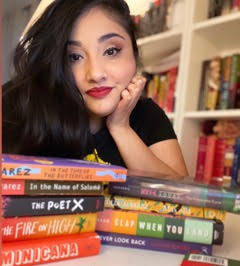
Marisela Gomez
Biography: Marisela Gomez is Chicana born and raised in California who loves literature. She reads Latinx, Chicanx and Mexican Literature as a way to find herself. Gomez’s bookstagram page features reads from all genres, but the main focus is on Latinx literature. She believes in amplifying Latinx voices, and wants others to know that there are authors out there who see us, who are us. Reading these stories help Marisela understand the beautiful struggle of belonging to two cultures. IG: @marisbookclub
1. When did your love for books begin?
My love for books began at a young age. Since we couldn’t afford to buy them, my mom took me to the library. Those trips to the library are memories I will treasure forever.
2. Favorite types of books?
I honestly read and enjoy all genres, but Historical Fiction is my go to.
3. Why is it so important to see representation for womxn of color, minorities and other marginalized people in the creative space of writing? And more importantly, published for others to read their truths?
It is important to see representation of womxn of color and minorities in writing, and be published, because there are so many of us who crave these stories and need these stories as a way to self heal. It is a beautiful thing to read a book and be able to relate to it, or learn from diverse experiences.
4. What brings you Alegría?
What brings me happiness is seeing the look on my son’s face when he reads a book that resonates with him. When he reads books with characters that look like him.

